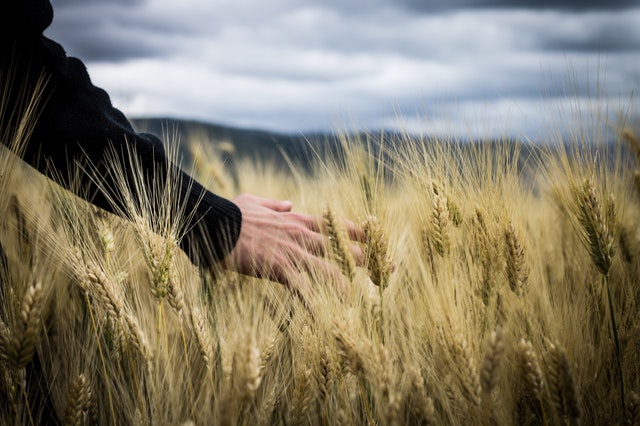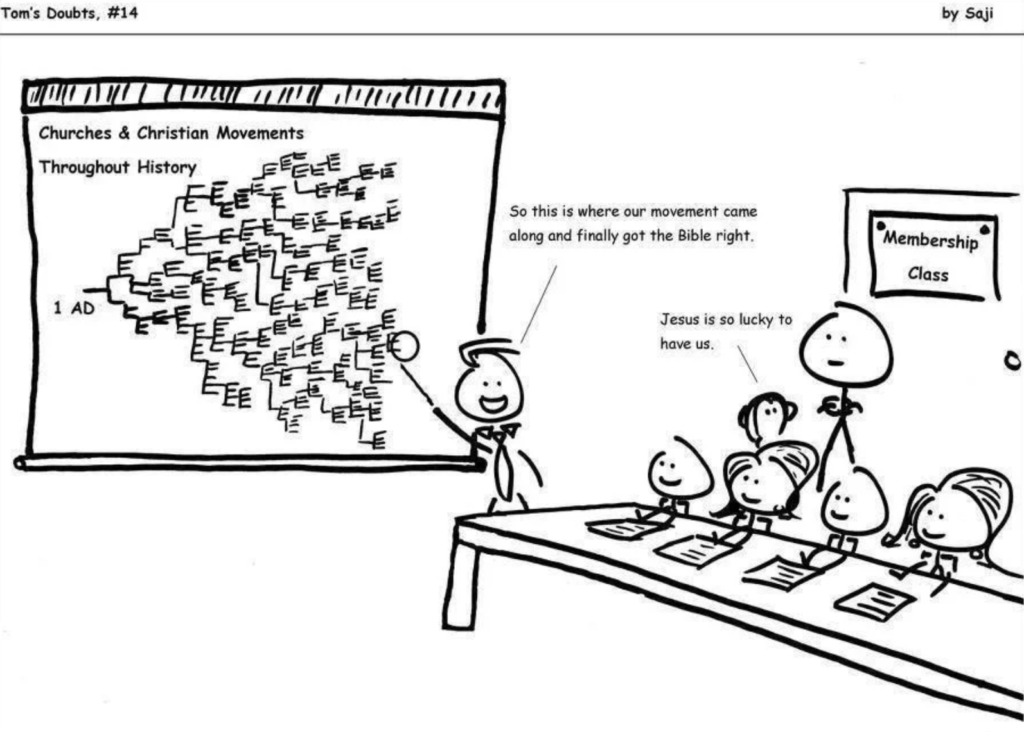
This is a sermon that I preached on Sunday, 12/8/19, at Berkeley Friends Church. The scripture readings for this sermon were: Matthew 3:1-12. You can listen to the audio, or keeping scrolling to read my manuscript. (The spoken sermon differs from the written text)
Listen to the Sermon Now
We’re in the time now that the world calls Christmas. This whole stretch between Thanksgiving and the 25th of December, this is what secular, Western European consumer culture thinks of as “the Christmas season” – or, if you like, “the holiday season.”
And that’s all fine and good for playing jingle bells and selling us more stuff on Black Friday and Cyber Monday and “I-Ate-Too-Much Tuesday,” or whatever other retail-oriented holy day they try to lay on us next. This “holiday season” is just fine and dandy for a culture that has turned our father’s house into a den of thieves.
But for us as the church, we are nowhere near Christmastime yet. We have not arrived at the birth of the Christ-child. Instead, we’ve now entered into the season of Advent. Advent is a time when we are waiting. We’re in anticipation. Expectation. It’s a time of reflection and repentance, a time to examine ourselves as individuals and as a community. It’s a time to be called deeper into a life of discipleship, a life that more fully reflects God’s love and justice.
In short, this is the season of John. John the Baptist, the wild man who left a life of privilege in Jerusalem and dedicated himself to prayer, fasting, and prophetic teaching in the wilderness of Judea.
We are in the season of baptism. Immersion. A time of cleansing from our old ways of thinking – a radical reorientation into the path of Jesus. It’s a time to confess our sin, change our attitudes, and prepare ourselves for the coming of the Christ child, the light of God within us.
In those days, before Jesus had left his family and his work as a carpenter to become an itinerant preacher, John’s ministry was already in full-swing. People were coming out to him from across Judea and Jerusalem, to hear his fiery message of repentance and redemption. To hear the message about the coming messiah. To prepare themselves for the reckoning that was coming upon Israel, and indeed the whole world.
The people who came out to hear John were receiving the message with joy. They were being baptized in the river Jordan, confessing their sins. They were preparing themselves for the one who would come to redeem Israel.
Now it’s interesting, because it seems like just about everybody was coming out to hear John preach. Rich and poor, young and old, socially conscious and socially awkward. Everybody wanted a piece of this guy.
But John wasn’t happy to see everybody. Some of the people who came out, John questioned their motivations and intentions. Just like Jesus, John had some very harsh words for the Pharisees and Sadduccees who came out to visit him beside the Jordan.
“You snakes in the grass! Who warned you to flee from the wrath to come?” John could see that the uptown religious people – the Pharisees – weren’t there to change their lives in the radical way required by the kingdom of heaven. Maybe they thought they could come and practice one more ritual that would make them even more holy. Maybe they heard John was a lively and entertaining preacher. They were there for incremental self-help, not for the full-bodied transformation that God offers.
And the Sadducees – why were they there at all? Their place was in the Temple, with the important people and all the money. The Sadducees, the ultimate hedge fund managers of their day – maybe they were curious about what John was up to. After all, he used to be one of them.
John came from luxury and power, the top of the Temple hierarchy. His father was a high priest, a son of Aaron. John could have had everything, but he threw it all away to go preach along dusty roads to the poor and unclean. The Sadducees as a class represented everything John rejected – form without substance, wealth without conscience, and spiritual adultery with violent political power.
What did John have to say to these spiritual tourists and gawkers? “Bear fruit worthy of repentance! Do not presume to say to yourselves, ‘We have Abraham as our ancestor.’; for I tell you, God is able from these stones to raise up children to Abraham.”
The Pharisees thought that they could fulfill the law of God by following every jot and tittle of the law, keeping themselves clean and pure. The Sadducees thought that they owned the law. They were gatekeepers of the Temple, the performers of animal sacrifice. They saw themselves as the custodians of God’s dwelling place on earth. Who could be more important?
Both groups saw themselves as children of Abraham. Heirs of the promise, God’s promise to bless and prosper forever.
But John’s message to all of them is: “Don’t think your ancestry will save you. Don’t think your spiritual lineage will justify you. Don’t think your religious observances will spare you from the wrath that is coming on Jerusalem and Judea. This story doesn’t depend on you.”
Because the insider religious crowd and people will lots of wealth and political power – we like to think that we’re doing things for God. “Isn’t God just so lucky to have us? What would he do without us?”
John tells us exactly what he will do. He’ll raise up children to Abraham from these stones.

If we think that we’re doing things for God, we’ve got it all wrong. God does not depend on us. God does not need us. He loves us, he longs for us, but he does not need us in any pragmatic or instrumental sense. God’s plans do not hinge on our action or inaction.
Now don’t get me wrong. I’m not saying our actions don’t matter. But they matter a whole lot more to us than they do to God. God’s gonna figure it out. God’s got the whole world in his hands. This is the God who created the entire universe out of nothing. He’s got it on lock, don’t trip.
What’s at stake here is not God’s kingdom. God’s making it happen. Period.
What is at stake is the part we’re going to play in this whole unfolding drama of history. Are we going to join up, go to basic training, and do what it takes to become trustworthy soldiers in the Lamb’s War? Or will we keep on serving ourselves, mistreating our neighbors, and bowing to the power of money and Empire?
We already know how this story ends. We know that the kingdom of God has come near and will be fulfilled. We know that love wins.
But when this victory comes, when God reigns triumphant and all things are made new – will we be a part of that story? Will we be part of that newness? Will we hear our master’s voice saying to us, “Well done, good and faithful servant!”?
That was the question, that was the message that John had for everyone who came out to see him: Now is the time. Time to make a choice. Time to decide what our life is going to be about.
It’s time to prepare ourselves, because the baptism of spirit and fire is coming. Jesus is going to sort things out. His winnowing fork is in his hand. He will clear his threshing floor and will gather his wheat into the granary. But he’ll burn the chaff with unquenchable fire.
You know, I’ll admit that I had to look up what a winnowing fork is. Because this is not something I run into in my daily life as a 21st-century city-dweller. But it turns out that a winnowing fork is sort of like a rake, and you use it by throwing whole heads of grain up into the air.
And the idea is that when the wheat goes up in the air, the inner part of the wheat – the heavy grain – will fall to the ground, where it can be collected. The light, chaffy parts – all that stuff that surrounded and protected the wheat, but which is now dead and useless – all that stuff will just blow away. No need to even bother with it anymore.
Where is the chaff in us? What are the parts of our lives that seemed important, that felt like they lent us protection but are in fact holding us back from following God and loving our neighbors with our whole hearts? Where are all the dead places that are ready to be blown away by the breath of God?
Where is the wheat in us? Here in this community. In your heart. Where’s the wheat? What does it look like for that wheat to be gathered? To be planted, watered, and nurtured? To grow and bear fruit worthy of repentance? What does it look to live our lives as true children of Abraham, children of the promise?
God doesn’t need us, but he will plant us so that we can bear fruit. God doesn’t rely on us, but he loves us and desires to welcome us into his kingdom. That kingdom has come near. Now is the time to prepare ourselves to receive it.
“The voice of one crying out in the wilderness:
‘Prepare the way of the Lord,
make his paths straight.’”